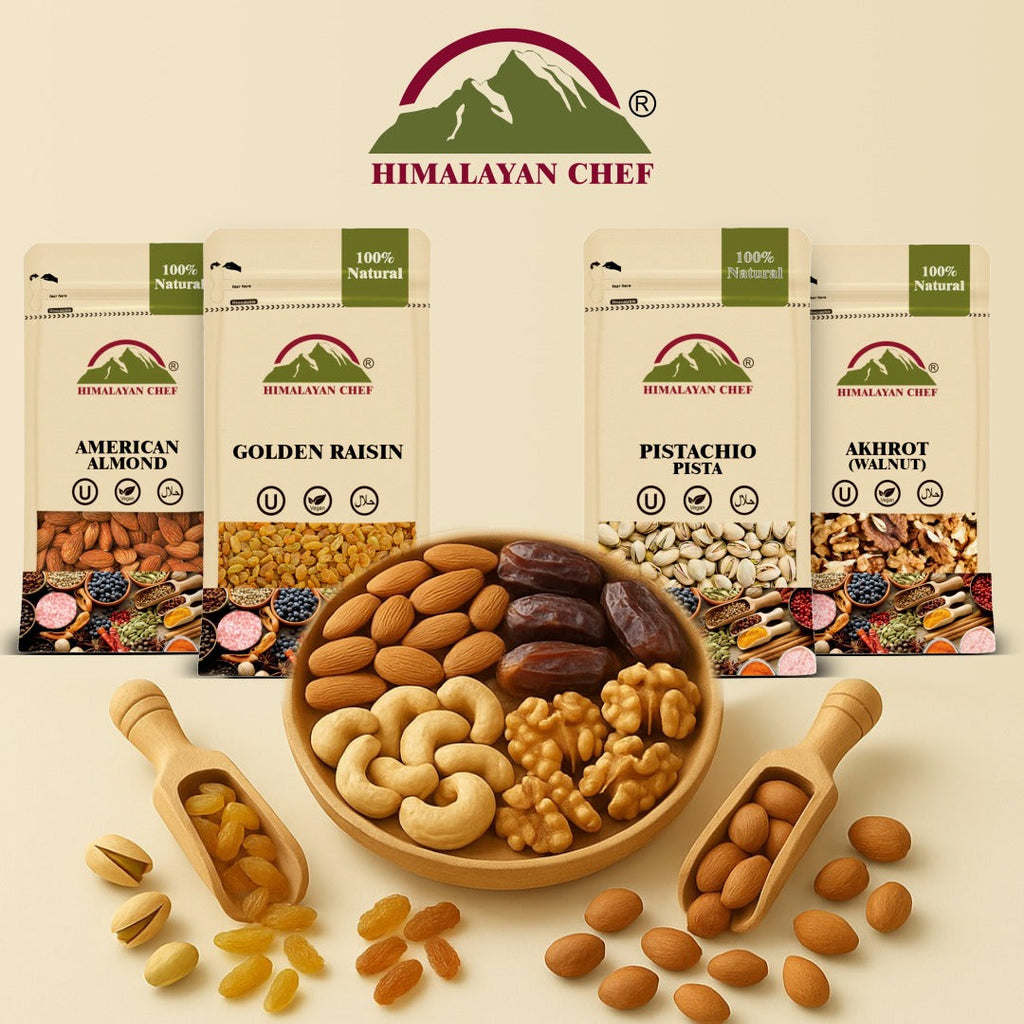Dry Fruits Myths and Facts You Should Know: Hidden Truths for Healthy Eating
Posted by HIMALAYAN CHEF

Dry fruits are popular snacks in many homes. People call them full of benefits. But there are also many myths about dry fruits that confuse shoppers. Some say dry fruits cause weight gain. Others think they always have added sugar. Many believe soaked dry fruits are only the healthy option. These ideas may sound true, but facts tell a different story. In this blog, we look at common dry fruits myths and real facts you should know. Learn what makes dry fruits healthy, how to enjoy them daily and what to avoid. Get a clear answer without the confusion.
What are Dry Fruits?
Dry fruits are fresh fruits that lose most of their water through sun drying or air drying. This makes them smaller, sweeter and easier to keep for months. Many see them as healthy because they keep key nutrients and natural sugars.
Common dry fruits include:
These dry fruits bring natural sweetness to meals or snacks without needing extra sugar.
Knowing the facts helps cut through myths. Dry fruits can be part of balanced eating when you watch how much you eat. A small handful is enough for most people each day.
Common Dry Fruits Myths and the Real Facts
Dry fruits myths and facts often confuse people who want to eat healthy. Let’s look at what’s true and what isn’t.
Myth 1: Dry fruits always cause weight gain
Some believe eating dry fruits leads to weight gain. The fact is, dry fruits are calorie dense but also rich in fiber and healthy fats. A small handful can help you feel full and avoid overeating other snacks. The key is portion size. Dry fruits myths and facts show that it’s not dry fruits alone but eating large amounts that can add extra calories.
Myth 2: All dried foods contain added sugar
Another common myth is that every type of dry fruit has added sugar. The truth is many natural dry fruits like plain raisins, figs, and dates do not have extra sugar. It’s the candid or glazed types that do. Checking labels helps you pick unsweetened options. But the fact is natural ones can be sweet without syrups.
Myth 3: Dry fruits soaked in water are always healthier
In the belief that it will make them healthier, many people soak dry fruits. When they soak, they become softer and perhaps easier to stomach. There are no additional vitamins or minerals added, according to scientific evidence. Dry fruits myths and facts remind us that soaking is a personal preference rather than a health requirement
Myth 4: Dry fruits never expire
Some think dry fruits last forever. The fact is, they do have a shelf life. Keeping them in airtight containers and a cool, dry place helps them stay fresh longer. Checking expiry dates avoids waste and keeps snacks safe.
Myth 5: Roasted dry fruits lose all nutrients
Another myth is that roasting destroys every nutrient. The truth is roasting may reduce some heat sensitive vitamins but keeps fiber, minerals and healthy fats. Dry fruits myths and facts show roasted dry fruits still stay healthy when eaten plain without salt or oil.
Dry fruits myths and facts help us see this food clearly. Knowing what’s true helps us enjoy dry fruits as part of a balanced diet.
Nutritional Value and Health Impact of Dry Fruits
Dry fruits pack with real nutrients into small bites. They keep natural fiber, vitamins and minerals even after drying.
Key nutrients in dry fruits:
- Fiber which helps digestion
- Vitamins like A, E and K for skin and health
- Minerals such as iron, calcium and potassium
Role of Dry Fruits in Overall Health
Dry fruits do more than taste good. They support many parts of health when eaten right.
1. Antioxidants in Dry Fruits
Antioxidant properties present in dry fruits prohibit cell damage. They support defense systems and shield the body from free radicals.
2. Dry Fruits for Heart Health
A few dry fruits support heart health. They may help regulate blood pressure and reduce bad cholesterol.
3. Dry Fruits for Weight Loss
Fiber and good fats are provided by dry fruits. A tiny handful can reduce appetite and aid in weight management.
4. Dry Fruits for Digestion
Fiber in dry fruits supports the gut. It helps food move and eases constipation.
5. Dry fruits for Glowing Skin
Vitamins found in dry fruits keep skin smooth. They can provide a healthy glow and gradually reduce the appearance of aging.
6. Dry Fruits for Brain Health
The brain benefits from nutrients like the good fats found in dry fruits. They might help improve concentration and memory.
7. Dry Fruits for Strong Bones
Dry fruits give minerals like calcium and magnesium. This helps keep bones strong and protect bone density.
8. Dry Fruits for Blood Sugar Control
The glycemic index of certain dry fruits is low. When consumed in moderation, they can help maintain stable blood sugar levels
How to Include Dry Fruits in Your Daily Diet?
There are simple ways to incorporate dry fruits into meals. They provide nutrients, crunch, and sweetness without adding additional sugar.
Ideas for Breakfast
- Add dry fruits to porridge or oatmeal.
- To yogurt, add chopped dates or figs
- To add natural sweetness to smoothies, blend raisins in.
Healthy Snacks
- In between meals, eat a tiny handful or mixed dry fruits
- To create a well-balanced trail mix, mix them with nuts.
- Top energy balls or bars with apricots or raisins
These snacks provide rapid energy and prolong feelings of fullness.
Using Dry Fruits in Cooking and Baking
- Top baked goods with chopped dry fruits
- They can be mixed into rice dishes to add flavor and color
- Added to cakes, muffins, or homemade granola.
Facts and myths about dry fruits warn us to consume them sparingly. When used in moderation, they maintain meals’ flavors, nutritional value, and health.
Choosing Best Quality Dry Fruits in Pakistan
Not all dry fruits are the same. Quality depends on how they’re dried and stored. Picking natural dry fruits without added sugar keeps snacks healthy.
Look for brands that sell premium dry fruits with no syrup or oil. Himalayan Chef offers a range of 100% natural dry fruits that keep taste and nutrition. Their products come sealed fresh, so you can enjoy real flavor and health benefits. When you buy the best dry fruits online, check labels for added sugar or salt. Choose items that list only fruits itself.
FAQs
1. What are 10 dry fruits?
Raisins, dates, figs, apricots, prunes, cranberries, cherries, apples, pears, and peaches. All keep natural sweetness and fiber after drying.
2. Which dry fruit is the healthiest?
The best foods for heart and brain health are almonds and walnuts. They provide nutrients, protein, and good fats.
3. Can I eat dry fruits every day?
Yes, but keep portions small to avoid extra calories. A small handful each day is enough.
4. Which dry fruits have more protein?
Almonds led among dry fruits for protein content. They also add fiber and healthy fats.
5. Is it good to eat dry fruits in summer?
Yes, dry fruits stay healthy in any season. Choose natural unsweetened types and watch portions
TAGS:
SHARE:


